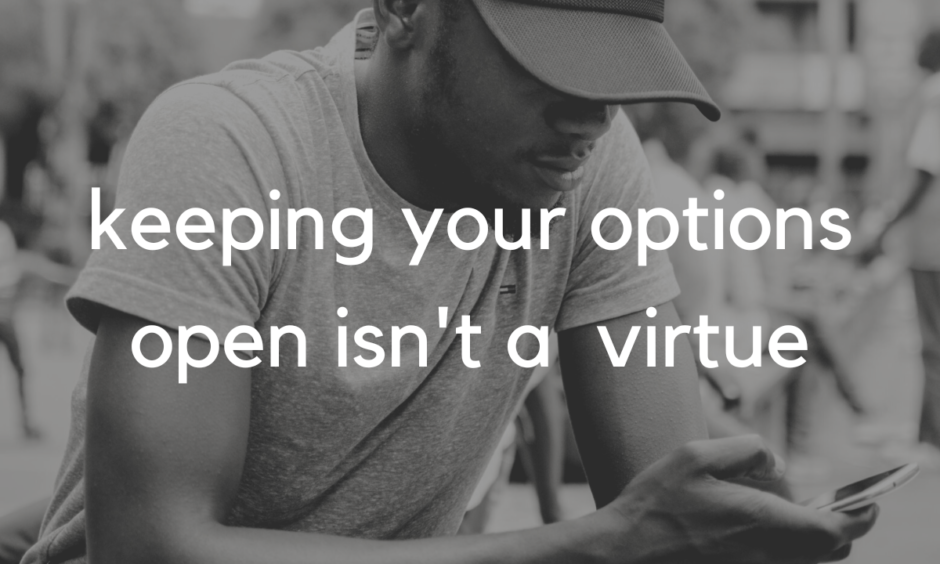In ten years of young adult ministry I’ve planned a lot of events and sent out thousands of invitation in the form of texts, messages, and phone calls. I haven’t tracked this exactly, but I can say with confidence that by far and away the most common response I get from young adults to those invitations is some variation of “maybe”. It shows up in statements like, “I’ll see if I can make it,” or, “I’ll probably be there,” or, “I’ll have to see what else is going on that night.” This seems to be particularly true of those who are single.
If I contact fifteen people, I’ve come to expect no response from eight of them, a yes from one or two, and a maybe from the rest. I’ve been on the receiving end of invitations and done the same thing. Dozens of times.
Initially in writing this I grabbed a couple scriptures that could easily be used as proof texts to make my point, but this isn’t some scriptural issue. It’s more of a personal frustration. It isn’t overtly sinful to not respond clearly when someone contacts you. There’s nothing explicitly wrong about wanting to keep your schedule open to see what else comes up.
However, I see in myself and others in their teens, twenties, and early thirties a desire to keep our options open for the sake of our own convenience and pleasure. When someone invites me to come over next Friday, I want to keep my commitment at a “maybe” level so that if something better comes up I can switch to that.
There’s a problem with that, particularly if you call yourself a follower of Jesus. Keeping your options open may not be a sin, but it’s certainly not a virtue. At its root it’s often done because we’re thinking about what’s best for ourselves rather than what would be most loving for others.
The Problem
The problem with keeping your options open is that it assumes you’re more valuable than the other person. The Apostle Paul writes multiple times throughout his epistles about how we are to value others more highly than ourselves. Jesus declares that the people who are greatest in the Kingdom of God are those who live as servants of others. If we want to exemplify Christ in our lives we need to think more of the other person than we do of ourselves.
This goes far beyond how we respond to invitations to events or activities and into the habitual stance of our hearts. When Jesus came to earth he didn’t keep his options open with a “get back to heaven” clause. When he was confronted with desire to change course and avoid the inconvenience and pain of the cross, he pressed forward for the good of those who he came to save.
The better way
Saying maybe and keeping your options open isn’t always a bad thing, but it shouldn’t be our default. Instead, we need to take the time to step back and define our priorities. Clarify your schedule so that you can give a straightforward answer. Don’t say maybe if you mean no just because uncomfortable with rejecting someone. Speaking from a decade plus of inviting people to things, I feel much more respected when someone says, “Sorry, I can’t make it – I have _____ going on.” than when someone says, “We’ll see.”
Commit to communicate and acknowledge people’s requests, even if you can’t give them a solid answer immediately. If someone shoots you a text asking a question that you can’t answer immediately, don’t wait for three days to respond. Just respond and let them know you’ll get back to them as soon as you can. Then actually get back to them as soon as you can.
One of my intentions for 2019 is to do a better job of valuing others more than I value myself. I want to “look to the interests of others” (Phil. 2:3) more than I look to my own interests because that’s what Jesus did. Part of that looks like committing to things fully rather than keeping my options open. Will you join me?





2 Comments
Hey, great post. Thank you! This is definitely something that has bothered me in the past too, and something we need to consider as a culture. I think you make an excellent point that by not responding clearly or committing one way or the other we are actually valuing ourselves over others. This is something we should all consider more. But, at least in my experience, saying “maybe” isn’t about waiting to see if something better comes along (usually there isn’t much else going on), its more about not being sure you truly belong even when you are invited. Its about being uncomfortable in a setting where most people would think “Everyone else here is having a great time, so why am I not?” I heard recently a radio announcer talking about a study correlating people’s use of Instagram with depression. Its not Instagram causing depression, I think it’s that depressed people are people who are lonely and under valued who are seeking safe connection through any means they can find. Despite all our social media and tech, we are actually a very disconnected culture. People everywhere are longing for people who will offer them real true connection and friendship not just an event to attend. So it’s not the event their saying maybe to, it’s whether or not they will be valued and feel valued at that event.
Great point Given! That longing to belong is always tied with a simultaneous fear of whether or not we’ll truly belong.